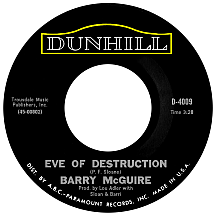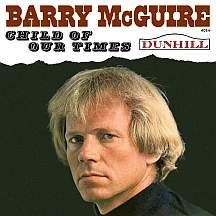BARRY McGUIRE
Eve of Destruction
It's almost here. The end of the world could take place as early as tomorrow. 'The eastern world, it is explodin'...violence flarin', bullets loadin'...' It's a dire situation: 'If the button is pushed, there's no runnin' away...there'll be no one to save with the world in a grave.' Am I being a little too pessimistic? Don't blame me. P.F. Sloan wrote these words well over a half century ago.
Oklahoma-born Barry McGuire started playing the ukulele around 1947, at age 12. He spent most of his teenage years in and around San Pedro, California, later serving in the Navy, working on a fishing boat, toiling at various odd jobs and playing guitar. At age 25 he began performing in nightclubs, which led to a chance meeting with Peggy Lee, who was impressed with his talent and helped him get into higher-profile clubs like Hollywood hot spot the Troubadour. Barry and Ray Stanley (a local songwriter who penned Perry Como's hit "Glendora," worked with Eddie Cochran and recorded a few rock and roll songs of his own) composed "The Tree" (a dramatic, spoken nature story ending in "Timber!"); released in 1961, this first effort was followed by Barry's take on a "teen tragedy" song, "Cindy and Johnny," also written by Stanley. Both were released on the small Mosaic label but generated very little interest.
McGuire met Beverly Hills native Barry Kane and in 1962 they recorded an album, Here and Now!, for Horizon Records as Barry & Barry. Rod McKuen's "One by One," a solo single by McGuire the following year, did well in Wisconsin and other parts of the midwest. Randy Sparks caught a B&B show one night and offered both Barrys a spot touring with his recently-formed group, The New Christy Minstrels, later deciding McGuire would make a great lead singer. "Green, Green," a Sparks-McGuire tune, was a hit in the summer of '63, followed by another popular single, "Saturday Night," both positive, exuberant uptempo numbers with Barry's prominent vocals. The act was big in size (usually ten or eleven members) and very popular, but Barry had an itch to create more meaningful, socially relevant songs. Working solo, he recorded enough folk standards for a full album, though it went unreleased for about two years. Remaining with the New Christy Minstrels through the following year, he abuptly quit after completion of a European tour in January 1965.
That spring he met producer Lou Adler, the head of Dunhill Productions, who'd hit pay dirt the previous year with Johnny Rivers' ongoing string of hits. In the process of starting Dunhill Records (as an ABC-Paramount subsidiary), Adler suggested a song written by Phil "P.F." Sloan that fit in with the rising "protest song" movement. "Eve of Destruction" embraced the worst fears of a world in the throes of madness ('...marches alone can't bring integration...human respect is disintegratin'...' and an extra-harsh closing line, 'Hate your next door neighbor, but don't forget to say grace'); the song was certain to gain attention and likely to polarize listeners. Barry had doubts as to its potential, seeing as how the lyrics offered no solutions to the serious problems pointed out in the song.
A rough demo version recorded in July was leaked to KFWB and within days it was all over the radio; reactions came instantly and, despite divisive opinions from political extremists, the song sped rapidly up the charts, hitting number one by the end of September '65. A group that called themselves The Spokesmen (Danny and the Juniors singer David White, "At the Hop" composer John Madara and Philadelphia DJ Ray Gilmore of WIBG) wrote and recorded "Dawn of Correction" for Decca, with a nearly line-by-line counterpoint (sung by Madara in imitation of McGuire's style), summing it up with '...I say you're wrong, we're just on the dawn of correction.' Many stations aired this opposing view and it reached the top 40 in October.
Mira Records released Barry's previously-recorded material as The Barry McGuire Album (in addition to a single, "Greenback Dollar") and "The Tree" was reissued on Era. "Eve" follow-up "Child of Our Times" ('...you are your own worst enemy') took a milder approach while skirting the social context of the chart-topping hit. McGuire had been friends with Cass Elliot since she was with The Big 3 a couple of years earlier and helped get her new group in the door at Dunhill; Adler was impressed with The Mamas and the Papas and signed the quartet, having them do backing vocals on Barry's album This Precious Time. Papa John Phillips contributed "California Dreamin'" to the project, then the song ended up becoming the group's ticket to stardom when Adler dubbed Denny Doherty's vocal on the master in place of McGuire's (as well as a flute where the original recording's bridge had a harmonica).
With each attempt, Barry's songs seemed to generate less and less interest. "Cloudy Summer Afternoon (Rain Drops)" bypassed the doomsday rant in favor of a lighthearted love story; a mid-chart Billboard single in mid-'66, it received its fair share of support and was a top ten hit in a few cities. In 1967, he gave Bob Dylan's "Masters of War" a shot prior to a Sloan-Steve Barri tune, "Lollipop Train," that isn't as pleasant as the title would suggest. In '68, his final Dunhill disc was "Top O' the Hill," a clap-along song of hope penned by Michael Smith, Phil "Fang" Volk and Drake Levin of The Raiders. By that time, ABC Records had complete ownership of Dunhill and Adler had started a new label, Ode, under an agreement with Columbia; McGuire's only Ode single came in 1970, a rural spoken-and-sung folk tune, "The Old Farm."
'Take a look around you boy, it's bound to scare ya, boy...' A career in music can be quite challenging and even a number one hit doesn't guarantee lasting success. Barry kept going and the rewards post-"Destruction" were small, but worth the effort. He had a role in 1967's The President's Analyst starring James Coburn and was part of the cast of the original '68-'69 run of the blockbuster Broadway musical Hair. Surviving a serious bout with drug use, he later came to the conclusion that major stardom would certainly have done him in and he was better off not being too successful. Finding Christianity in the 1970s, he made inspirational recordings for the Myrrh and Sparrow labels, setting a path and remaining on it. Barry McGuire has embraced his fate without regret.



